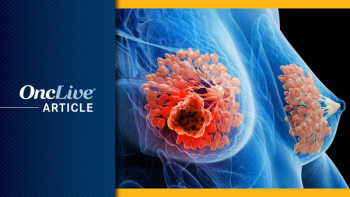
IMpassion130: Design and Preliminary Efficacy
Transcript:
Sara M. Tolaney, MD, MPH: The IMpassion130 trial was a randomized phase 3 study that evaluated whether adding a checkpoint inhibitor to chemotherapy would improve outcomes for patients with metastatic triple-negative breast cancer. The trial randomized patients in the first-line setting with metastatic triple-negative disease to receive either nab-paclitaxel alone or nab-paclitaxel and atezolizumab. It’s important to realize that all patients who went on to the study had to be a year out from their adjuvant taxane, and they were also stratified by their PD-L1 status.
The trial had a complicated design in terms of assessing end points. So, it looked at coprimary end points for both progression-free survival [PFS] and for overall survival; it looked at these both within the intention-to-treat population as well as within patients who had PD-L1—positive disease. So, it had a hierarchical design such that you had to meet your end point in the intention-to-treat population in order to statistically analyze the outcome in patients with PD-L1–positive disease.
The trial found that adding atezolizumab to nab-paclitaxel did improve PFS, both in the intention-to-treat population as well as within patients who had PD-L1—positive tumors. The difference was about 2 1/2 months in terms of PFS inpatients who had PD-L1–positive triple-negative disease. When we looked at overall survival, we actually saw that the study did not meet the overall survival end point in the intention-to-treat population. So, again, remembering the hierarchical design, statistically, they couldn’t actually analyze the outcome in the PD-L1–positive group. However, this was still looked at, and what was found was that there was a 7-month difference in overall survival favoring the addition of atezolizumab.
And so while technically one couldn’t statistically analyze these, I think, to us, it’s just such a clinically relevant difference in overall survival that I think it shows checkpoint inhibition added to taxane chemotherapy really is not only providing an improvement in PFS in patients with PD-L1—positive disease but is also extending survival for our patients with PD-L1–positive disease. And so this is really critical because prior to the use of checkpoint inhibition in triple-negative disease, overall survival was only around 12 to 13 months for our patients. Having an option that extends survival for this population of patients is really quite critical.
Transcript Edited for Clarity




































